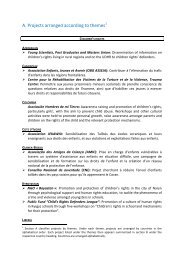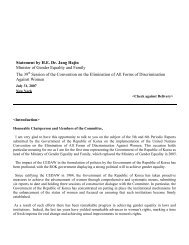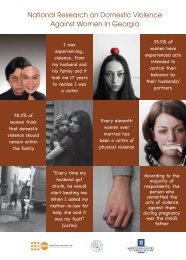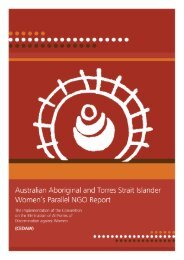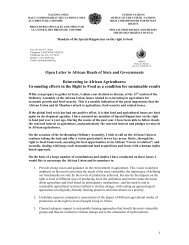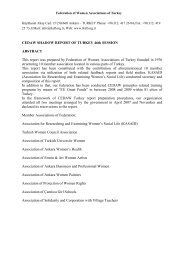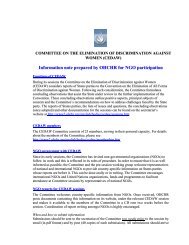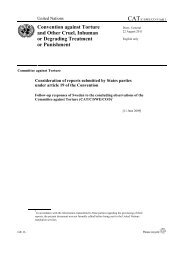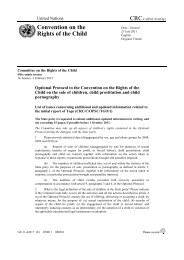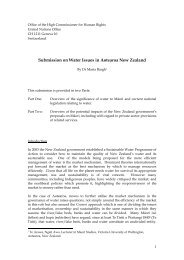Report - Office of the High Commissioner on Human Rights
Report - Office of the High Commissioner on Human Rights
Report - Office of the High Commissioner on Human Rights
- No tags were found...
Create successful ePaper yourself
Turn your PDF publications into a flip-book with our unique Google optimized e-Paper software.
<str<strong>on</strong>g>of</str<strong>on</strong>g> naming my eldest child. When we first arrived at our house, it was in a state to be demolished because<br />
it had been aband<strong>on</strong>ed when <str<strong>on</strong>g>the</str<strong>on</strong>g>y left for New Zealand. I wanted to live in a nice and adequate house,<br />
so I put in a lot <str<strong>on</strong>g>of</str<strong>on</strong>g> m<strong>on</strong>ey, stress and hard work to renovating <str<strong>on</strong>g>the</str<strong>on</strong>g> house. When my mo<str<strong>on</strong>g>the</str<strong>on</strong>g>r visited<br />
and I showed her what I had d<strong>on</strong>e, she said “Stop, d<strong>on</strong>’t renovate any fur<str<strong>on</strong>g>the</str<strong>on</strong>g>r”. The reas<strong>on</strong> was because<br />
I did not have a s<strong>on</strong>. She explained if my husband were to drop dead today I would have no rights<br />
to <str<strong>on</strong>g>the</str<strong>on</strong>g> house or land, and all <str<strong>on</strong>g>the</str<strong>on</strong>g> hard work would be wasted. As harsh as it sounded – it was actually<br />
<str<strong>on</strong>g>the</str<strong>on</strong>g> law that my mo<str<strong>on</strong>g>the</str<strong>on</strong>g>r was spelling out! I had to take into account what my mo<str<strong>on</strong>g>the</str<strong>on</strong>g>r said – it is in<br />
<str<strong>on</strong>g>the</str<strong>on</strong>g> law and <str<strong>on</strong>g>the</str<strong>on</strong>g> cultural ideology.<br />
Elements – Cultural appropriateness – culture has placed male power or male patriarchy over every<br />
o<str<strong>on</strong>g>the</str<strong>on</strong>g>r entitlement in T<strong>on</strong>ga’s society. Culture governs absolutely everything in society. It inserts<br />
patriarchal power into our c<strong>on</strong>stituti<strong>on</strong>, nati<strong>on</strong>al government, parliament, local government, our family<br />
structures and relati<strong>on</strong>s, our churches, our schools, <str<strong>on</strong>g>the</str<strong>on</strong>g> police, our health system, our work places our<br />
village communities…(our pubic and private sectors). So through such a patriarchal system <str<strong>on</strong>g>of</str<strong>on</strong>g><br />
instituti<strong>on</strong>s, it is no w<strong>on</strong>der that:<br />
– Women’s right to own land is not recognized;<br />
– Women’s lived experiences are clearly irrelevant;<br />
– The majority <str<strong>on</strong>g>of</str<strong>on</strong>g> women over generati<strong>on</strong>s have come to accept <str<strong>on</strong>g>the</str<strong>on</strong>g> cultural ideologies c<strong>on</strong>nected<br />
to land.<br />
Cultural patriarchy is a bomb.<br />
Sources –<br />
– T<strong>on</strong>gan C<strong>on</strong>stituti<strong>on</strong> (1875) - Secti<strong>on</strong> 107 provides for ‘T<str<strong>on</strong>g>of</str<strong>on</strong>g>ia’ (hereditary estate) – scheduled<br />
hereditary estates are held by nobles and matapule; secti<strong>on</strong> 4 provides for equality before <str<strong>on</strong>g>the</str<strong>on</strong>g><br />
law;<br />
– Land Act – governs rights to ‘api ‘uta (tax allotment) and ‘api kolo (town allotment). Every T<strong>on</strong>gan<br />
male is entitled to a tax and town allotment when he reaches 16. This clearly discriminates against<br />
women and is not c<strong>on</strong>sistent with secti<strong>on</strong> 4 <str<strong>on</strong>g>of</str<strong>on</strong>g> <str<strong>on</strong>g>the</str<strong>on</strong>g> c<strong>on</strong>stituti<strong>on</strong> (equality before <str<strong>on</strong>g>the</str<strong>on</strong>g> law).<br />
The Land Act states that inheritance <str<strong>on</strong>g>of</str<strong>on</strong>g> hereditary estates will take place according to secti<strong>on</strong><br />
107 <str<strong>on</strong>g>of</str<strong>on</strong>g> <str<strong>on</strong>g>the</str<strong>on</strong>g> C<strong>on</strong>stituti<strong>on</strong>. Legitimate male and female children are eligible, but primarily <str<strong>on</strong>g>the</str<strong>on</strong>g> eldest<br />
male and his heirs inherit <str<strong>on</strong>g>the</str<strong>on</strong>g> estate. If <str<strong>on</strong>g>the</str<strong>on</strong>g> eldest s<strong>on</strong> has no heirs, <str<strong>on</strong>g>the</str<strong>on</strong>g> sec<strong>on</strong>d male child will<br />
be given priority, and so <strong>on</strong> until <str<strong>on</strong>g>the</str<strong>on</strong>g> male line ends. If <str<strong>on</strong>g>the</str<strong>on</strong>g> male line dies out <str<strong>on</strong>g>the</str<strong>on</strong>g> eldest female<br />
line will succeed. If <str<strong>on</strong>g>the</str<strong>on</strong>g> female line dies out <str<strong>on</strong>g>the</str<strong>on</strong>g> land <str<strong>on</strong>g>the</str<strong>on</strong>g>n reverts back to <str<strong>on</strong>g>the</str<strong>on</strong>g> male line. A woman<br />
who is widowed can remain <strong>on</strong> <str<strong>on</strong>g>the</str<strong>on</strong>g> land until she dies, remarries or fornicates. Cultural patriarchy<br />
is a nuclear bomb;<br />
C<strong>on</strong>structive trusts for <str<strong>on</strong>g>the</str<strong>on</strong>g> house and property (but not <str<strong>on</strong>g>the</str<strong>on</strong>g> land) can be set up. But for a woman<br />
to claim a share she has to prove she directly c<strong>on</strong>tributed a certain amount <str<strong>on</strong>g>of</str<strong>on</strong>g> <str<strong>on</strong>g>the</str<strong>on</strong>g> finances to <str<strong>on</strong>g>the</str<strong>on</strong>g><br />
marriage. The n<strong>on</strong>-financial c<strong>on</strong>tributi<strong>on</strong>s are not taken into account. In <str<strong>on</strong>g>the</str<strong>on</strong>g> case <str<strong>on</strong>g>of</str<strong>on</strong>g> Etueni Alatini,<br />
<str<strong>on</strong>g>the</str<strong>on</strong>g> wife was unsuccessful in making her claim because she couldn’t provide evidence <str<strong>on</strong>g>of</str<strong>on</strong>g> financial<br />
c<strong>on</strong>tributi<strong>on</strong>s to <str<strong>on</strong>g>the</str<strong>on</strong>g> c<strong>on</strong>secutive trust and <str<strong>on</strong>g>the</str<strong>on</strong>g> n<strong>on</strong>-financial c<strong>on</strong>tributi<strong>on</strong> was not taken into account.<br />
Fur<str<strong>on</strong>g>the</str<strong>on</strong>g>r, as a widow, <strong>on</strong>ly if she remains sexually inactive, is she entitled to a proporti<strong>on</strong> <str<strong>on</strong>g>of</str<strong>on</strong>g> <str<strong>on</strong>g>the</str<strong>on</strong>g><br />
ec<strong>on</strong>omic value <str<strong>on</strong>g>of</str<strong>on</strong>g> <str<strong>on</strong>g>the</str<strong>on</strong>g> property, up to <str<strong>on</strong>g>the</str<strong>on</strong>g> amount <str<strong>on</strong>g>of</str<strong>on</strong>g> her financial c<strong>on</strong>tributi<strong>on</strong>s;<br />
EXECUTIVE SUMMARY 191




